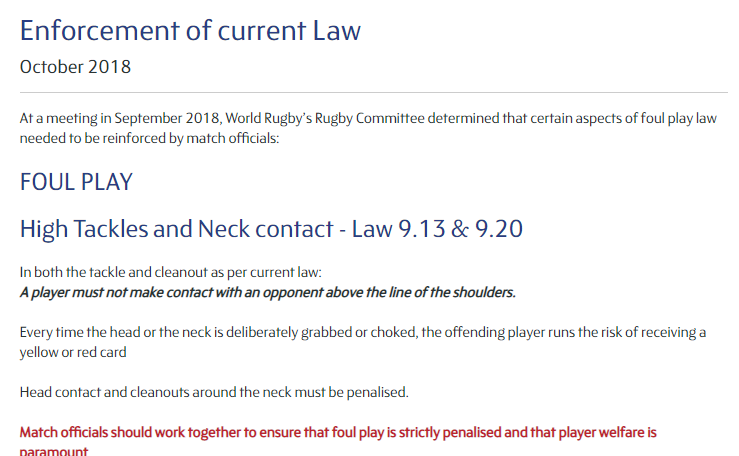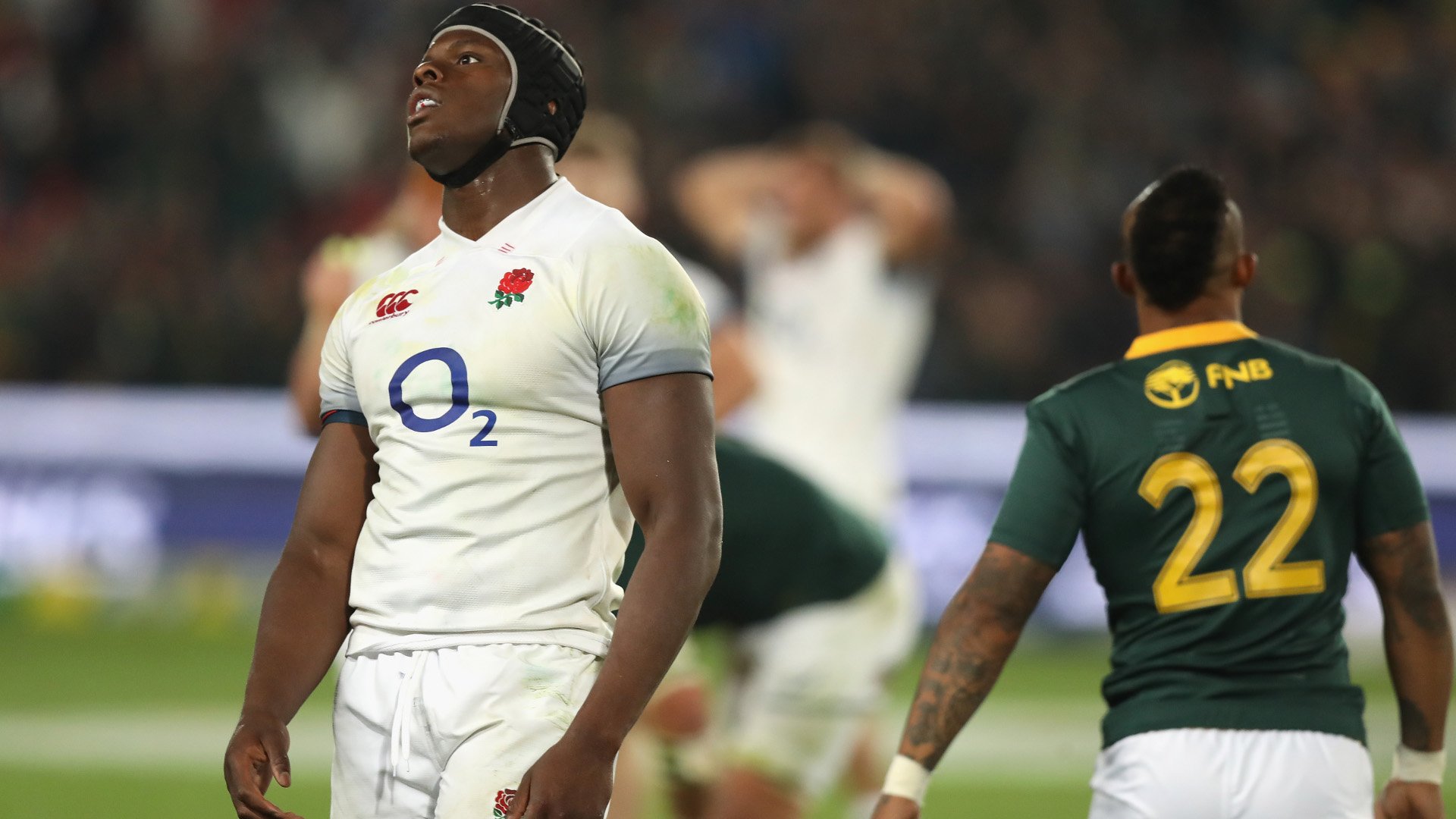Law trials and changes
-
This

-
Interesting article from August about concussion, the effect of recent law changes and this year's law trials (as far as they've already been analysed). It's a long read, but worthwhile IMO.
How has World Rugby come to the point of the 'nipple line' and 'armpit line'?
-
-
@taniwharugby
"The study found 44 per cent of the sampled kick-offs were contested, with just four injuries incurred and 10 penalties. Of the instances where an injury resulted, three came from a one-person lift and one from a two-person lift."A little perspective before outlawing yet another aspect of play might be beneficial.
-
World Rugby consider penalising players who get concussed
World Rugby is considering taking the extraordinary step that if a tackler is upright in a tackle and gets concussed, they’d also face a suspension because they’ll be deemed at fault.
“What we’re trying to do through a number of processes is to bring the tackle height down to protect more the tackler rather than the ball carrier,” World Rugby’s chief medical officer Martin Raftery told reporters at a briefing in Sydney.
“Yes, we’ve got to protect the ball carrier as well but the focus is on the tackler.
“There’s three phases and one phase is increasing the sanctions.
“By increasing the sanctions for illegal tackles, we’re more likely to protect the ball carrier but we’re hoping by increasing the sanctions, it draws attention to that issue and therefore the coaches start to improve the technique which then brings about lowering the tackle height.
“Second intervention is the high tackle warning system.
“That’s about penalising a tackler for being upright in a tackle who has then clear and obvious contact with the ball carrier.
“And it doesn’t matter whether the ball carrier is injured or the tackler is injured.
“If they’re upright and there’s clear and obvious head contact, he’ll receive an extra penalty, which is an off field penalty.”
-
@antipodean I've read that twice and can't actually make sense of it.
-
@antipodean What a bullshit. Being punished for causing your own injury.
-
@stargazer well it does make some sense, if you weren't playing you wouldnt have got injured!
-
@taniwharugby Wrong logic. The "not playing" happens after getting injured.
-
@stargazer nah, you made the decision to play rugby, so your fault.
Perfect logic.
-
According to the Rugby Australia website:
World Rugby introduced the law with immediate effect last week, after a contentious decision to suspend Israel Folau over an aerial collision with Ireland skipper Peter O’Mahony in the third June Series Test. Folau was suspended after a contest with O’Mahony where the backrower was lifted by teammate CJ Stander and then fell awkwardly. World Rugby has moved to add a new law 9.19 that explicitly states players are responsible for bringing their teammates back to ground.It's amazing how swift WR can act if some countries are moaning. I wonder whether they had been so quick to change the law if it had been an All Black, PI player or tier 2/3 player who had been yellow carded for this.
By the way, there's nothing about this new law on the WR website yet. I'll post it when it is.
-
World Rugby has moved to add a new law 9.19 that explicitly states players are responsible for bringing their teammates back to ground.
Clear license to run at and pull them off balance. Not your fault anymore.
-
Not really a law trial relating to the game, but a trial of officiating protocols and a law application guideline.
World Rugby approves revised TMO trial for November tier one hosted tests
World Rugby and its Member Unions have underscored their ongoing commitment to consistent and accurate match officiating by approving a closed trial revising the scope of the Television Match Official (TMO) in the November tests hosted by Tier one unions. Confirmation of the trial comes after a full review of the current global trial and the variant used in Super Rugby by a working group of match officials, coaches, players and administrators, reflecting the sport’s commitment to ensuring best-possible match officiating practice. The key objective of the review was to review current practice with a view to further reduce TMO reliance and time impact, while ensuring clear, consistent and accurate on-field decision-making. The following principles were agreed following detailed consideration: * Try scoring should be an on-field decision with the referee being responsible, but the team of four can all contribute * The current list of potential infringements for which a TMO can be referred will be retained, but any referral needs to be prompt, clear and consistent * The ‘on the run’ chat between the match officials and TMO for foul play will be removed with the onus on the referee, who should only refer to the TMO issues that are clear and obvious serious acts of foul play, including penalty kick, yellow card or red card as a potential sanction in order to protect player welfare * Match officials can review foul play up to when the game restarts, when a penalty is kicked to touch and when foul play footage becomes available * Proposal to include live broadcast of the TMO in action.World Rugby has also issued a law application guideline reinforcing current law for match officials in relation to high tackles and neck contact. (Click here to review) As announced last week, an amendment to Law 9 (9.26) has been introduced with immediate effect relating to lowering players to ground safely in open play (Click here to review).
-
@stargazer said in Law trials and changes set for 2017 and beyond:
The ‘on the run’ chat between the match officials and TMO for foul play will be removed with the onus on the referee, who should only refer to the TMO issues that are clear and obvious serious acts of foul play, including penalty kick, yellow card or red card as a potential sanction in order to protect player welfare
I like that. Less power in hands of whoever is responsible for the broadcasting / stadium TV feed
-
This part makes no sense whatsoever: The "referee, who should only refer to the TMO issues that are clear and obvious..." If it's bloody 'clear and obvious' there is no need for a TMO, because it is clear and fucking obvious! The point of a TMO is to pick up things that are not clear and obvious, like borderline tries. "Clear and obvious", bloody muppets. Just drop the TMO, apart from checking the actual grounding of tries, and the game would be much better. Then have a wider brief for the citing commissioner and sort it out after, show time, so we don't have to sit through boring TMO decisions at the game.
-
@machpants said in Law trials and changes set for 2017 and beyond:
This part makes no sense whatsoever: The "referee, who should only refer to the TMO issues that are clear and obvious..."
Nothing quite like dragging back a try for a poxy knock-on a ruck or two before. It's part of modern rugby


